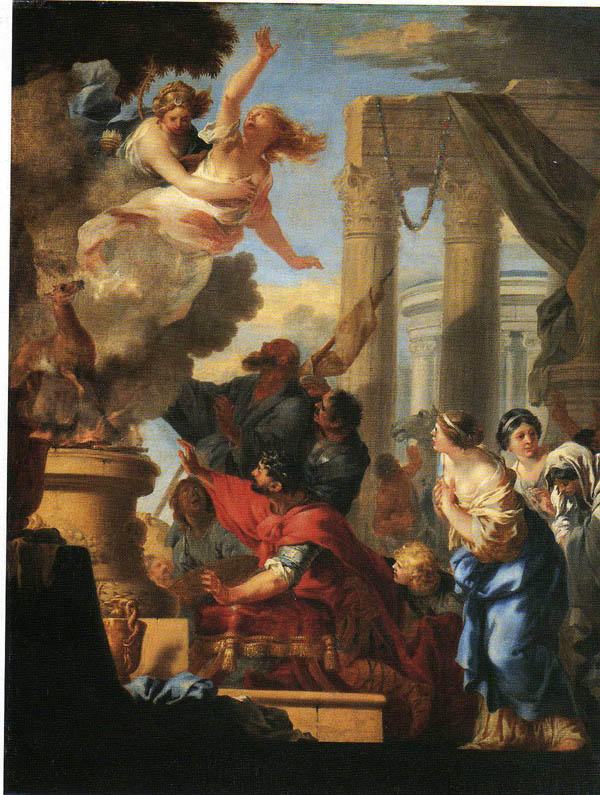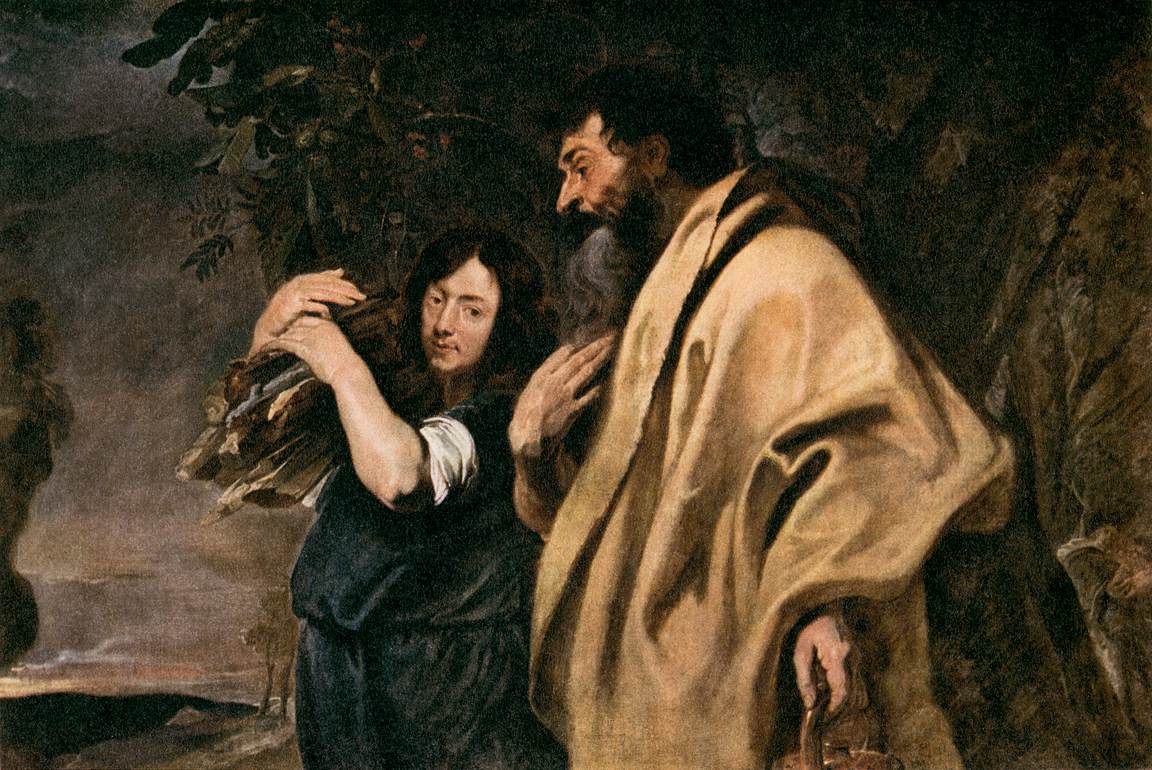|
Fear And Trembling
''Fear and Trembling'' (original Danish title: ''Frygt og Bæven'') is a philosophical work by Søren Kierkegaard, published in 1843 under the pseudonym ''Johannes de silentio'' (Latin for ''John of the Silence''). The title is a reference to a line from Philippians 2:12, "...continue to work out your salvation with fear and trembling." — itself a probable reference to Psalms 55:5, "Fear and trembling came upon me..." Kierkegaard wanted to understand the anxiety that must have been present in Abraham during the Binding of Isaac. Abraham had a choice to complete the task or to refuse to comply with God's orders. He resigned himself to the three-and-a-half-day journey and to the loss of his son. "He said nothing to Sarah, nothing to Eliezer. Who, after all, could understand him, for did not the nature of temptation extract from him a pledge of silence? He split the firewood, he bound Isaac, he lit the fire, he drew the knife." Because he kept everything to himself and chose no ... [...More Info...] [...Related Items...] OR: [Wikipedia] [Google] [Baidu] |
Søren Kierkegaard
Søren Aabye Kierkegaard ( , , ; 5 May 1813 – 11 November 1855) was a Danish theologian, philosopher, poet, social critic, and religious author who is widely considered to be the first existentialist philosopher. He wrote critical texts on organized religion, Christianity, morality, ethics, psychology, and the philosophy of religion, displaying a fondness for metaphor, irony, and parables. Much of his philosophical work deals with the issues of how one lives as a "single individual", giving priority to concrete human reality over abstract thinking and highlighting the importance of personal choice and commitment. He was against literary critics who defined idealist intellectuals and philosophers of his time, and thought that Swedenborg, Hegel, Fichte, Schelling, Schlegel, and Hans Christian Andersen were all "understood" far too quickly by "scholars". Kierkegaard's theological work focuses on Christian ethics, the institution of the Church, the differences between purely ... [...More Info...] [...Related Items...] OR: [Wikipedia] [Google] [Baidu] |
Hope
Hope is an optimistic state of mind that is based on an expectation of positive outcomes with respect to events and circumstances in one's life or the world at large. As a verb, its definitions include: "expect with confidence" and "to cherish a desire with anticipation." Among its opposites are dejection, hopelessness, and despair. In psychology Professor of Psychology Barbara Fredrickson argues that hope comes into its own when crisis looms, opening us to new creative possibilities. Frederickson argues that with great need comes an unusually wide range of ideas, as well as such positive emotions as happiness and joy, courage, and empowerment, drawn from four different areas of one's self: from a cognitive, psychological, social, or physical perspective. Hopeful people are "like the little engine that could, ecausethey keep telling themselves "I think I can, I think I can". Such positive thinking bears fruit when based on a realistic sense of optimism, not on a naive "f ... [...More Info...] [...Related Items...] OR: [Wikipedia] [Google] [Baidu] |
Hebrew
Hebrew (; ; ) is a Northwest Semitic language of the Afroasiatic language family. Historically, it is one of the spoken languages of the Israelites and their longest-surviving descendants, the Jews and Samaritans. It was largely preserved throughout history as the main liturgical language of Judaism (since the Second Temple period) and Samaritanism. Hebrew is the only Canaanite language still spoken today, and serves as the only truly successful example of a dead language that has been revived. It is also one of only two Northwest Semitic languages still in use, with the other being Aramaic. The earliest examples of written Paleo-Hebrew date back to the 10th century BCE. Nearly all of the Hebrew Bible is written in Biblical Hebrew, with much of its present form in the dialect that scholars believe flourished around the 6th century BCE, during the time of the Babylonian captivity. For this reason, Hebrew has been referred to by Jews as '' Lashon Hakodesh'' (, ) since an ... [...More Info...] [...Related Items...] OR: [Wikipedia] [Google] [Baidu] |
Scholar
A scholar is a person who pursues academic and intellectual activities, particularly academics who apply their intellectualism into expertise in an area of study. A scholar can also be an academic, who works as a professor, teacher, or researcher at a university. An academic usually holds an advanced degree or a terminal degree, such as a master's degree or a doctorate ( PhD). Independent scholars, such as philosophers and public intellectuals, work outside of the academy, yet publish in academic journals and participate in scholarly public discussion. Definitions In contemporary English usage, the term ''scholar'' sometimes is equivalent to the term ''academic'', and describes a university-educated individual who has achieved intellectual mastery of an academic discipline, as instructor and as researcher. Moreover, before the establishment of universities, the term ''scholar'' identified and described an intellectual person whose primary occupation was professional research. In ... [...More Info...] [...Related Items...] OR: [Wikipedia] [Google] [Baidu] |
Exegesis
Exegesis ( ; from the Ancient Greek, Greek , from , "to lead out") is a critical explanation or interpretation (logic), interpretation of a text. The term is traditionally applied to the interpretation of Bible, Biblical works. In modern usage, exegesis can involve critical interpretations of virtually any text, including not just religious texts but also philosophy, literature, or virtually any other genre of writing. The phrase ''Biblical exegesis'' can be used to distinguish studies of the Bible from other critical textual explanations. Textual criticism investigates the history and origins of the text, but exegesis may include the study of the historical and cultural backgrounds of the author, text, and original audience. Other analyses include classification of the type of literary genres presented in the text and analysis of grammar, grammatical and syntax, syntactical features in the text itself. Usage One who practices exegesis is called an ''exegete'' (; from the Greek ... [...More Info...] [...Related Items...] OR: [Wikipedia] [Google] [Baidu] |
Exordium (rhetoric)
Dispositio is the system used for the organization of arguments in the context of Western classical rhetoric. The word is Latin, and can be translated as "organization" or "arrangement". It is the second of five canons of classical rhetoric (the first being inventio, and the remaining being elocutio, memoria, and pronuntiatio) that concern the crafting and delivery of speeches and writing. The first part of any rhetorical exercise was to discover the proper arguments to use, which was done by the formalized methods of ''inventio''. The next problem was to select various arguments and organize them into an effective discourse. Aristotle Aristotle defined two essential parts of a discourse: the statement of the case and the proof of the case. For example, in a legal argument, a prosecutor must first declare the charges against the defendant and provide the relevant facts; then he must present the evidence that proves guilt. Aristotle allowed that in practice most discourse also ... [...More Info...] [...Related Items...] OR: [Wikipedia] [Google] [Baidu] |
Pseudonym
A pseudonym (; ) or alias () is a fictitious name that a person or group assumes for a particular purpose, which differs from their original or true name (orthonym). This also differs from a new name that entirely or legally replaces an individual's own. Many pseudonym holders use pseudonyms because they wish to remain anonymous, but anonymity is difficult to achieve and often fraught with legal issues. Scope Pseudonyms include stage names, user names, ring names, pen names, aliases, superhero or villain identities and code names, gamer identifications, and regnal names of emperors, popes, and other monarchs. In some cases, it may also include nicknames. Historically, they have sometimes taken the form of anagrams, Graecisms, and Latinisations. Pseudonyms should not be confused with new names that replace old ones and become the individual's full-time name. Pseudonyms are "part-time" names, used only in certain contexts – to provide a more clear-cut separation between o ... [...More Info...] [...Related Items...] OR: [Wikipedia] [Google] [Baidu] |
Regine Olsen
Regine Schlegel (née Olsen; 23 January 1822 – 18 March 1904) was a Danish woman who was engaged to the philosopher and theologian Søren Kierkegaard from September 1840 to October 1841. Olsen's relationship with Kierkegaard exerted a crucial influence over his intellectual development, philosophy and theology, and the legacy of their engagement figures prominently in his writings with all of his works except one dedicated to her and crediting her as a reason as to why he became a writer. Biography Early years and engagement to Kierkegaard Olsen was born on 23 January 1822 in Frederiksberg, a district of Copenhagen, Denmark. Her parents were Terklid Olsen, councilor of state and department head in the Finance Ministry, and Regine Ferderikke Malling Olsen. Her family home was located in Borsgade, near Knippelsbro. Growing up, she would paint miniatures. She first met Kierkegaard on a spring day in 1837 while visiting the home of Mrs Catrine Rordam when she was 15 and he 24. ... [...More Info...] [...Related Items...] OR: [Wikipedia] [Google] [Baidu] |
Iphigenia At Aulis
''Iphigenia in Aulis'' or ''Iphigenia at Aulis'' ( grc, Ἰφιγένεια ἐν Αὐλίδι, Īphigéneia en Aulídi; variously translated, including the Latin ''Iphigenia in Aulide'') is the last of the extant works by the playwright Euripides. Written between 408, after ''Orestes'', and 406 BC, the year of Euripides' death, the play was first produced the following year in a trilogy with ''The Bacchae'' and ''Alcmaeon in Corinth'' by his son or nephew, Euripides the Younger, and won first place at the City Dionysia in Athens. The play revolves around Agamemnon, the leader of the Greek coalition before and during the Trojan War, and his decision to sacrifice his daughter, Iphigenia, to appease the goddess Artemis and allow his troops to set sail to preserve their honour in battle against Troy. The conflict between Agamemnon and Achilles over the fate of the young woman foreshadows a similar conflict between the two at the beginning of the ''Iliad''. In his depiction of the exp ... [...More Info...] [...Related Items...] OR: [Wikipedia] [Google] [Baidu] |
History Of Aesthetics (pre-20th-century)
This is a history of aesthetics. Ancient Greek aesthetics The first important contributions to aesthetic theory are usually considered to stem from philosophers in Ancient Greece, among which the most noticeable are Plato, Aristotle and Plotinus. When interpreting writings from this time, it is worth noticing that it is debatable whether an exact equivalent to the term beauty existed in classical Greek. Xenophon regarded the beautiful as coincident with the good, while both of these concepts are resolvable into the useful. Every beautiful object is so called because it serves some rational end: either the security or the gratification of man. Socrates rather emphasized the power of beauty to further the more necessary ends of life than the immediate gratification which a beautiful object affords to perception and contemplation. His doctrine puts forward the relativity of beauty. Plato, in contrast, recognized that beauty exists as an abstract ''Form''. It is therefore absolute ... [...More Info...] [...Related Items...] OR: [Wikipedia] [Google] [Baidu] |
Georg Wilhelm Friedrich Hegel
Georg Wilhelm Friedrich Hegel (; ; 27 August 1770 – 14 November 1831) was a German philosopher. He is one of the most important figures in German idealism and one of the founding figures of modern Western philosophy. His influence extends across the entire range of contemporary philosophical topics, from metaphysical issues in epistemology and ontology, to political philosophy, the philosophy of history, philosophy of art, philosophy of religion, and the history of philosophy. Born in 1770 in Stuttgart during the transitional period between the Enlightenment and the Romantic movement in the Germanic regions of Europe, Hegel lived through and was influenced by the French Revolution and the Napoleonic wars. His fame rests chiefly upon ''The Phenomenology of Spirit'', ''The Science of Logic'', and his lectures at the University of Berlin on topics from his ''Encyclopedia of the Philosophical Sciences''. Throughout his work, Hegel strove to address and correct the probl ... [...More Info...] [...Related Items...] OR: [Wikipedia] [Google] [Baidu] |
Knight Of Faith
The knight of faith () is an individual who has placed complete faith in himself and in God and can act freely and independently from the world. The 19th-century Danish philosopher Søren Kierkegaard vicariously discusses the knight of faith in several of his pseudonymic works, with the most in-depth and detailed critique exposited in ''Fear and Trembling'' and in ''Repetition''. Overview Johannes de Silentio, Kierkegaard's pseudonymous author of ''Fear and Trembling'', argues that the knight of faith is the paradox, is the individual, absolutely nothing but the individual, without connections or pretensions. The ''knight of faith'' is the individual who is able to gracefully embrace life: Kierkegaard put it this way in ''Either/Or'', "When around one everything has become silent, solemn as a clear, starlit night, when the soul comes to be alone in the whole world, then before one there appears, not an extraordinary human being, but the eternal power itself, then the heavens open, ... [...More Info...] [...Related Items...] OR: [Wikipedia] [Google] [Baidu] |











